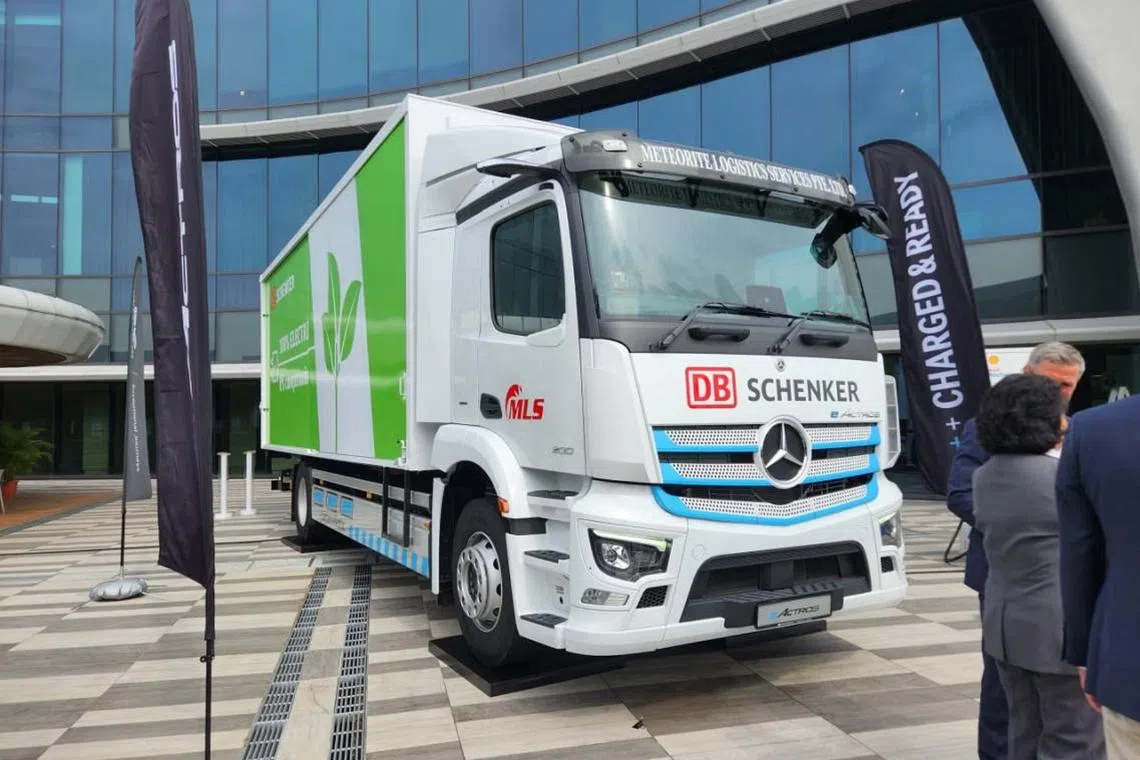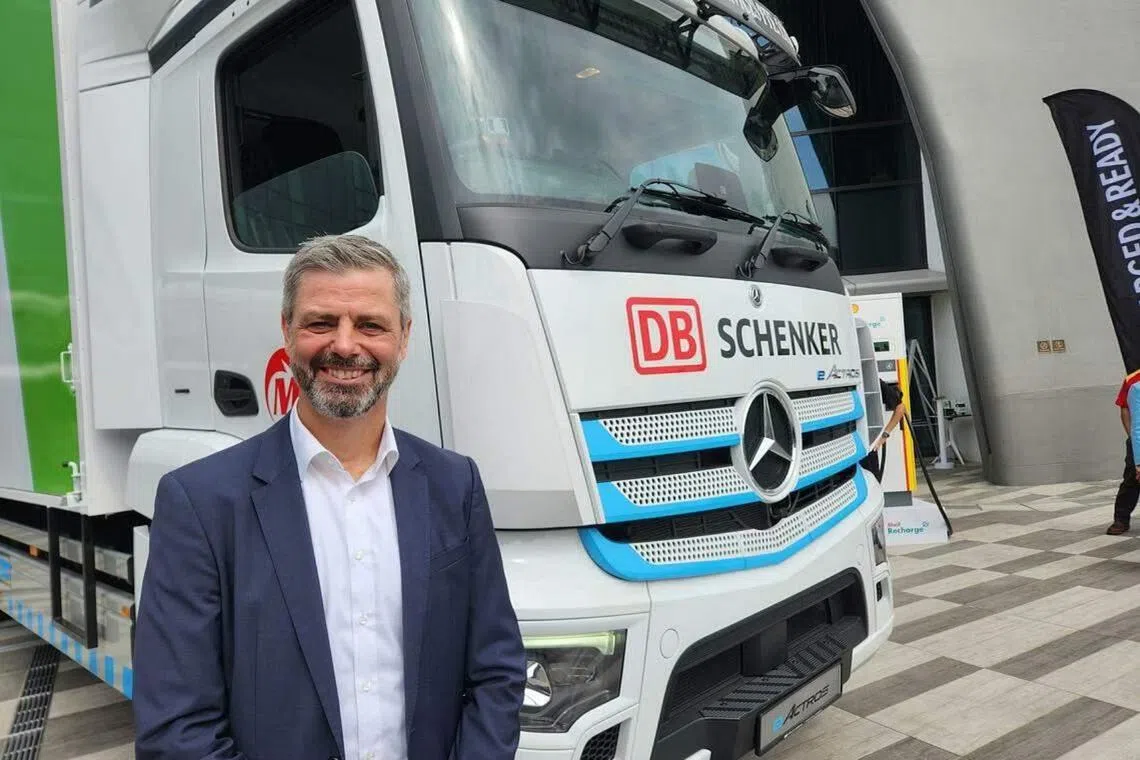Mercedes-Benz launches electric heavy truck in South-east Asia
Sign up now: Get ST's newsletters delivered to your inbox

The first unit of Mercedes-Benz eActros in Singapore was delivered to Meteorite Logistics Services.
PHOTO: THE BUSINESS TIMES
Derryn Wong
Follow topic:
SINGAPORE - Mercedes-Benz Trucks has launched its first electric heavy truck in South-east Asia.
The first unit of Mercedes-Benz eActros in Singapore was delivered to Meteorite Logistics Services, a logistics partner of DB Schenker, in a handover ceremony on Nov 21 by Daimler Commercial Vehicles South-east Asia (Daimler CV SEA). Daimler CV SEA is the parent company of Mercedes-Benz Trucks and its authorised distributor is Jardine Cycle & Carriage.
Mr Harald Schmid, chief executive of Daimler CV SEA, said there are plans to launch the eActros in Thailand, the Philippines and Malaysia in 2024.
In Asia, Daimler CV SEA has launched three electric heavy trucks in Hong Kong. They include the eActros, the Mitsubishi eCanter and the Mercedes-Benz eEconic garbage compactor. It has also launched the eActros in South Korea.
The German company bought Mitsubishi Fuso, the commercial vehicle business of Mitsubishi, in 2011.
Mr Schmid said that there has been “a lot of interest” from regional customers for zero-emissions trucks in the last eight to 12 months.
Key potential customers for the truck, he said, would be international logistics companies who have “sustainability as a key driver for their business over the next 10 years to 15 years”, plus regional logistics companies who have been looking to expand their electric fleets.
The eActros is the first fully electric heavy truck from Mercedes-Benz. First unveiled internationally in 2021, it is a battery-powered version of its diesel heavy truck, the Actros.
The truck is powered by two electric motors with an output of up to 400 kilowatts (kW).
It is available as the eActros 300 model with three battery packs or eActros 400 model with four battery packs. This gives a total battery capacity of 315 kilowatt hours (kWh) or 420 kWh as well as a quoted range of 300 km and 400 km, respectively.
At the maximum charge rate of 160 kW, the 315 kWh battery model will take around an hour to charge from 20 per cent to 80 per cent. Mercedes-Benz does not supply a charging solution with the truck.
Mercedes-Benz’s representatives did not reveal the exact cost of the vehicle, saying it varies depending on the customer specification, but The Business Times understands that the eActros, like most electric heavy trucks, costs around twice as much as an equivalent diesel model.
In the early stages of adoption, electric heavy trucks have a higher initial cost due to lower economies of scale, said Mr Schmid, adding that territories with subsidies, such as Hong Kong and Japan, have helped to alleviate this.

Mr Harald Schmid, chief executive of Daimler CV SEA, said there are plans to launch the eActros in Thailand, the Philippines and Malaysia in 2024.
PHOTO: THE BUSINESS TIMES
In general, an electric heavy truck can have a similar total cost of ownership due to lower running costs in terms of fuel and maintenance, and help companies meet ESG requirements since fleet emissions count as Scope 1 emissions.
Mr Schmid said that an electric heavy truck can save around 58 tonnes of carbon dioxide compared to a diesel truck, assuming a 65,000 km distance and fuel efficiency of 33 litres per 100 km.
Daimler CV SEA is also exploring the possibility of launching the long-haul version, the eActros 600. It debuted in Europe in October 2023 and can travel a distance of 500 km with a 40-tonne load.
Industry observers said that the launch of another electric heavy truck shows the maturing of the market for these vehicles, and is a chance to help further reduce carbon emissions and pollution in the transport sector.
Ms Aw Kah Peng, chairperson for Shell Companies in Singapore, said: “With commercial road transport playing a vital role in moving almost everything that modern society depends on, it is important to decarbonise and reduce its emissions. Electrification of vehicles, including heavy-duty trucks, is one way commercial vehicle owners can do this while they aim to meet the growing demand for transport in a lower-carbon world.”
Mr Anil Das, director of Logistics and Land Transport Cluster for JTC Corporation, said: “It is a positive move for both Singapore and the logistics sector, since heavy and very heavy goods vehicles accounted for half of all goods vehicles and buses in 2022. Singapore is targeting to reduce land transport emissions from the 2016 peak by 80 per cent by 2050.”
Mr Das added that Mercedes-Benz joins manufacturers that have unveiled heavy electric truck models for Singapore, including Scania, BYD, Dongfeng Motor Corporation and Volvo.
Volvo plans to introduce its electric heavy truck, the FL Electric, next year, while BYD and Scania both have fleets in operation in Singapore.
The adoption of electric light goods vehicles in Singapore has increased in 2023.
However, electric versions of heavy goods vehicles (which weigh between 3,501 kg and 16,000 kg) and very heavy goods vehicles (VHGVs) receive fewer incentives and see far less adoption as a result.
The eActros weighs 19,000 kg to 27,000 kg, and is classified as a VHGV – which are those that have a maximum laden weight of more than 16,000 kg under Land Transport Authority regulations. THE BUSINESS TIMES

